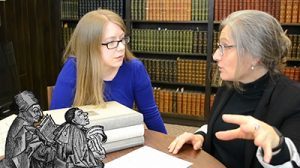 If Books Could Talk is a collaboration between Heather Wacha from History Corps, a digital public history project from the History Department at the University of Iowa, Colleen Theisen, Outreach & Engagement Librarian from Special Collections, and Katie Buehner, Head of the Rita Benton Music Library from the University of Iowa Libraries. Heather Wacha researched and wrote the episodes, Colleen Theisen served as the host, and Katie Buehner filmed and edited the series.
If Books Could Talk is a collaboration between Heather Wacha from History Corps, a digital public history project from the History Department at the University of Iowa, Colleen Theisen, Outreach & Engagement Librarian from Special Collections, and Katie Buehner, Head of the Rita Benton Music Library from the University of Iowa Libraries. Heather Wacha researched and wrote the episodes, Colleen Theisen served as the host, and Katie Buehner filmed and edited the series.
“If Books Could Talk,” explains that the paper, bindings, bookplates, repairs, stains, handwritten notes, stamps, and markings all leave traces that give clues to how they were made, where they have been, and can even tell about the lives of the people who have read them.
The final episode appears below. In it, Heather and Colleen examine two Medieval manuscript leaves and what we can learn from the layout, chapter headings, verse numbers and more. How does a Medieval manuscript Bible leaf differ from a Bible printed today, and what features have remained throughout the years?
Find out in the final episode of If Books Could Talk:
Or catch up on the whole series:
If you enjoy the videos, subscribe on YouTube.
Donate to the University Libraries’ Special Collections Fund
Want to stay connected? Follow us on social media:
